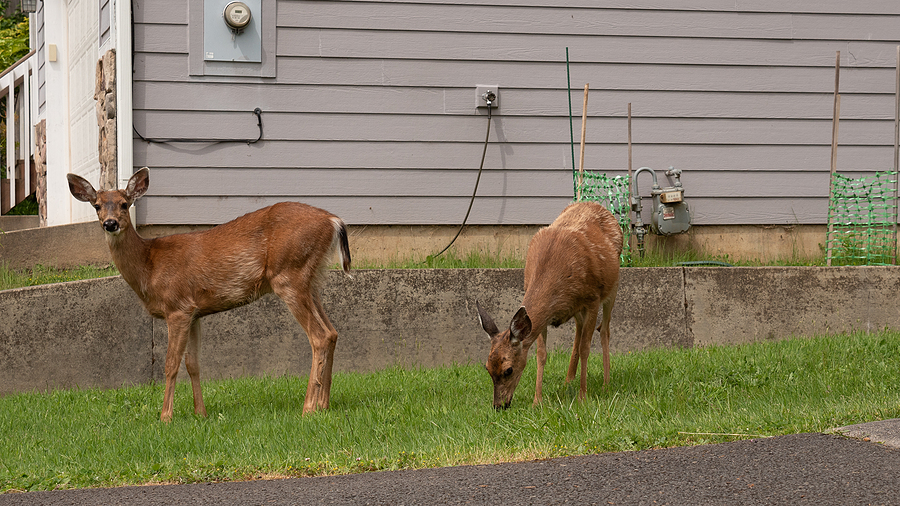As the serene beauty of deer grazing in the backyard can quickly turn into frustration when they begin to feast on your carefully cultivated garden, finding the right deer repellent becomes a crucial task for many homeowners. Whether you’re considering a homemade deer repellent or thinking about planting deer repellent plants, our guide aims to provide you with comprehensive and actionable information.
We’ll explore a variety of solutions, evaluating their effectiveness and ease-of-use, to assist you in making the best choice for protecting your home and garden from these beautiful, yet potentially destructive creatures.

Understanding Deer Behavior
Before diving into the different types of repellents, it’s essential to understand deer behavior and what attracts them to your property. Contrary to popular belief, deer are not solely herbivores; they also consume a significant amount of animal protein in their diet. Therefore, in addition to plants like flowers and vegetables, they also target bird feeders, fruit trees, and even garbage cans. Understanding what deer are attracted to will help you choose the most effective repellent for your specific situation.
The Different Types of Deer Repellents
Broadly speaking, there are three main categories of deer repellents: physical barriers, chemical repellents, and natural or homemade solutions. Let’s take a closer look at each type and its effectiveness.
▶ Physical Barriers
Physical barriers are the most effective method of keeping deer out of your property. These can include fences, netting, or even motion-activated sprinklers. However, these solutions can be costly and time-consuming to install. Moreover, they may not fit with the aesthetic of your property.
▶ Chemical Animal Repellents
Chemical repellents are a popular choice for many homeowners. These can come in the form of sprays, granules or even electronic devices that emit sound or light to deter deer. While they can be effective, their downside is that they may contain harmful chemicals and need to be reapplied regularly.
▶ Natural or Homemade Solutions
For those looking for an Eco-friendly and budget-friendly approach, natural or homemade solutions can be a great option. These can include planting deer repelling vegetation, using household items like soap or garlic to make DIY sprays, or even installing motion-sensing lights. While these may require more effort and experimentation to find the most effective solution, they are generally non-toxic and safe for use around children and pets.
▶ Deer Repellent Plants
Common types of plants that help repel deer include catmint, lavender, and sage. These plants have a strong scent that deer dislike, making them excellent natural repellents. However, it’s essential to note that planting these alone may not guarantee complete protection as deer may still be attracted to other items in your garden.
Selecting the Proper Deer Deterrent for Your Property
Now that we have explored the different types of deer repellents let’s discuss how to choose the right one for your home. It’s essential to consider factors such as effectiveness, ease-of-use, safety, and budget when making your decision. If you have a large property with multiple entry points, physical barriers may be the most suitable option. However, if you have a smaller garden and want to avoid harmful chemicals, natural or homemade solutions may be the way to go. Whichever option you choose, remember that regular maintenance and a combination of different types of repellents may be necessary for maximum effectiveness.
Conclusion
Deer can cause significant damage to your property, but with proper knowledge and the right repellent, you can keep them at bay. Remember to understand deer behavior, consider different types of repellents, and choose one that fits your specific needs. With a little effort and the right approach, you can enjoy the beauty of deer without worrying about their destructive tendencies.
We hope this blog post has been helpful and given you the confidence to take charge of your nuisance deer issue. For licensed and insured dead deer removal and deer repellent services in Nashville, Tennessee, don’t hesitate to contact Smoky Wildlife Control today. We also serve the Clarksville, TN area and surrounding counties, plus provide free estimates and advice.
Related Posts:
Deer-Proofing Your Landscape: Top Methods and Products
FAQS About Dead Deer Removal and Deer Repellent
The Pros and Cons of Different Types of Animal Repellents

